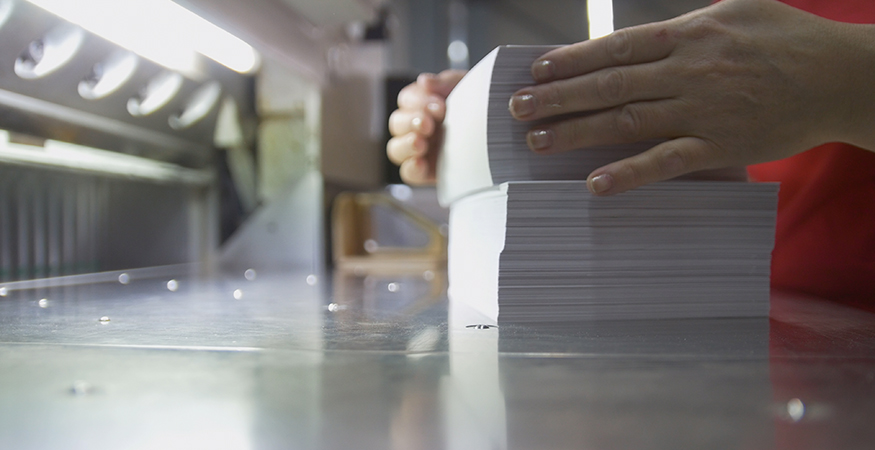One of the most important -but overlooked- keys to making great prints is paper, or media weight. Before you start any project, you should know what you will be printing it on and what paper stocks will make your project pop.
Sometimes your media choice must be made for practical reasons. If your prints will be mailed, choosing lighter paper will be best to cut down mailing costs. However, a custom-made, high-value product like invitations demands a heavy paper weight and you will want high-quality paper that will impress the recipient.
It is also important to remember that if your project has a cover, you will need different media weights for the cover and inside pages. For example, in perfect-bound or saddle-stitched books, catalogs, booklets and magazines, a heavy cover weight gives substance, while a lighter paper is used for the printed text.
How is Paper Weighed?
To begin, let’s explain how media is weighed. When you see paper measured in pounds, you can know that the thicker the paper stock, the higher the weight is going to be. Paper weights can be between 20 to 140 pounds, depending on the type of material the paper’s made from. A nice bond paper weighs between 20 and 80, while card stock ranges between 50 and 140 pounds. Of course, paper weight doesn’t measure how much an individual sheet of cut paper weighs, but it refers to the weight of a ream of uncut paper.
Some paper stocks are measured in points, which is a measure of thickness of the paper rather than the weight. Using points to determine paper thickness is a bit more scientific, measuring paper down to 1/1000th of an inch. A 10-point paper is 10/1000ths of an inch in thickness, while 15-point paper measures in at 15/1000ths of an inch. That might not seem like a lot of difference, but it is obvious in the final printed product.
Media Types to Know
Bond Paper: This is the standard paper used in copiers and printers in offices around the world. Also referred to as writing paper, the standard weights for bond paper include 16, 20, 24, 28, 32 and 36 pounds.
Text Paper: Used in commercial printing operations, text paper is typically featured on stationery and letterhead print jobs. Text paper is commonly offered in weights of 50, 60, 70, 80 and 100 pounds. As the weight increases within each paper type, so does the thickness or sturdiness of the paper. It can get confusing when you compare paper weight across paper types.
Common Text Paper Weights
50-pound text: The lightest common weight is used for softcover books and most documents. It’s one of the lightest available and is about the thickness of the standard copy or computer paper in an office.
70-pound text: Comic books, catalogs and other mass-produced printed materials use this lighter alternative.
80-pound text: A slightly lighter option used for magazines, catalogs or sometimes for large textbooks.
100-pound text: This paper weight can be is used in children’s books, comic book covers, brochures or coffee table books. It’s light enough for saddle-stitching and heavy enough to be a cover page in some formats.
Cover Paper Weights
10-point cover or 100# cover: One of the lightest cover stocks available, good for catalog covers or small perfect-bound booklets.
12-point cover or 110#: Cover stock for paperbacks, graphic novels and other larger perfect-bound covers.
16-point cover or 130# cover: A heavy cover stock, suited to projects that will be handled a lot or require a heavier cover, like catalogs, trade paperbacks and oversize perfect-bound products.
Card Stock Weights
65-pound card stock: This is a light card stock is good for light business cards, postcards, greeting cards and posters.
80-pound card stock: For business cards, postcards, folders, invitations, posters and greeting cards.
Card Stock/Cover Paper: Cover paper is a heavy, stiff paper that is available from as low as 50 pounds to as high as 120 pounds.
Bristol Paper: Originally from Bristol, England, this kind of paper is a remanent of the days when paper was made from rags. As you might guess, it is extremely thick, heavy paper for wedding invitations. It is available in either 67 or 120 pounds.
Index Paper: As the name suggests, this paper is used for index cards or postcards. It is stiff but inexpensive paper, available in 90, 110 and 140 pounds.
Tag Paper: This durable paper is used for signs and heavy-duty posters and is available in weights ranging from 100 to 200 pounds.
One last consideration is whether you need a finish or coating on your media choice. This will affect the weight of your paper stock. Gloss and silk coated covers are from 80 to 130 pounds, and from 80 to 100 pounds for texts. Uses might include pocket folders, packaging and display or postcards.
I hope this helps you when choosing the right paper for a printing project. If you need help with your commercial printing projects, please reach out to the production print experts at the Gordon Flesch Company. We have a staff of dedicated business analysts who can help you with any printing needs you may have.









